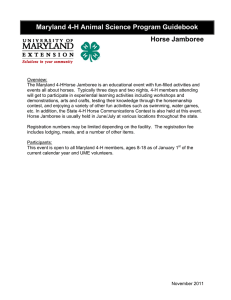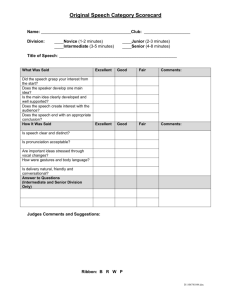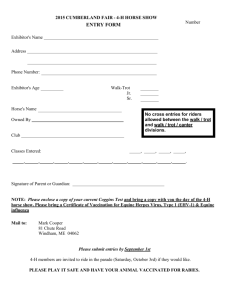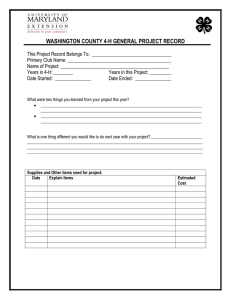Maryland 4-H Animal Science Program Information Sheet Maryland 4-H State Hippology Contest
advertisement
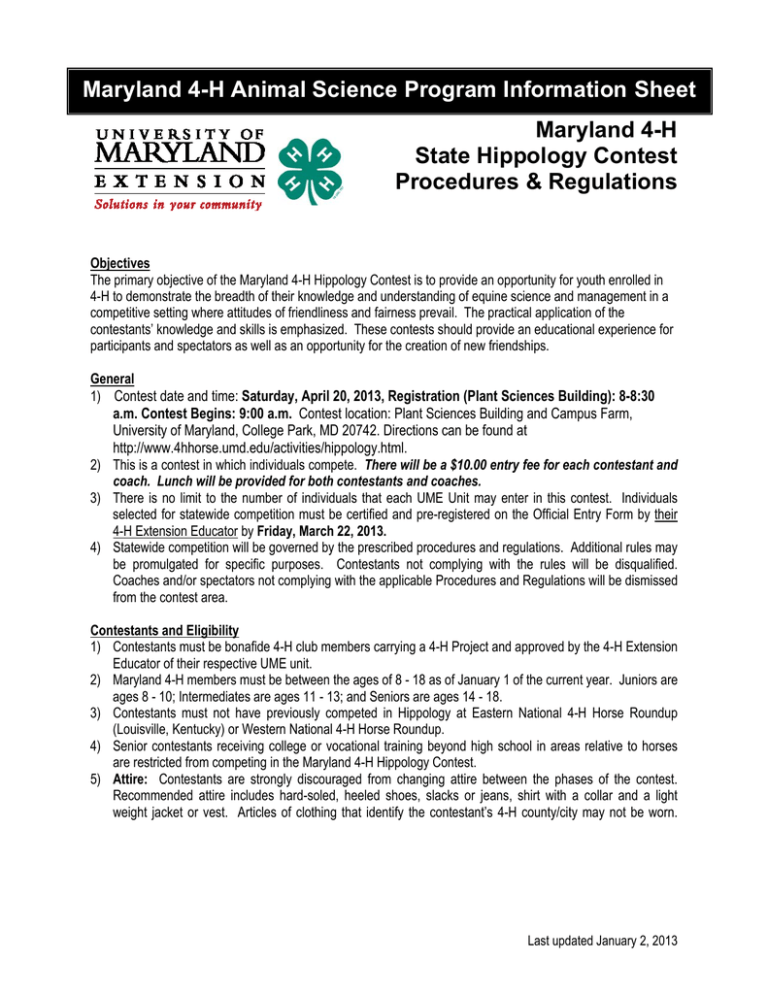
Maryland 4-H Animal Science Program Information Sheet Maryland 4-H State Hippology Contest Procedures & Regulations Objectives The primary objective of the Maryland 4-H Hippology Contest is to provide an opportunity for youth enrolled in 4-H to demonstrate the breadth of their knowledge and understanding of equine science and management in a competitive setting where attitudes of friendliness and fairness prevail. The practical application of the contestants’ knowledge and skills is emphasized. These contests should provide an educational experience for participants and spectators as well as an opportunity for the creation of new friendships. General 1) Contest date and time: Saturday, April 20, 2013, Registration (Plant Sciences Building): 8-8:30 a.m. Contest Begins: 9:00 a.m. Contest location: Plant Sciences Building and Campus Farm, University of Maryland, College Park, MD 20742. Directions can be found at http://www.4hhorse.umd.edu/activities/hippology.html. 2) This is a contest in which individuals compete. There will be a $10.00 entry fee for each contestant and coach. Lunch will be provided for both contestants and coaches. 3) There is no limit to the number of individuals that each UME Unit may enter in this contest. Individuals selected for statewide competition must be certified and pre-registered on the Official Entry Form by their 4-H Extension Educator by Friday, March 22, 2013. 4) Statewide competition will be governed by the prescribed procedures and regulations. Additional rules may be promulgated for specific purposes. Contestants not complying with the rules will be disqualified. Coaches and/or spectators not complying with the applicable Procedures and Regulations will be dismissed from the contest area. Contestants and Eligibility 1) Contestants must be bonafide 4-H club members carrying a 4-H Project and approved by the 4-H Extension Educator of their respective UME unit. 2) Maryland 4-H members must be between the ages of 8 - 18 as of January 1 of the current year. Juniors are ages 8 - 10; Intermediates are ages 11 - 13; and Seniors are ages 14 - 18. 3) Contestants must not have previously competed in Hippology at Eastern National 4-H Horse Roundup (Louisville, Kentucky) or Western National 4-H Horse Roundup. 4) Senior contestants receiving college or vocational training beyond high school in areas relative to horses are restricted from competing in the Maryland 4-H Hippology Contest. 5) Attire: Contestants are strongly discouraged from changing attire between the phases of the contest. Recommended attire includes hard-soled, heeled shoes, slacks or jeans, shirt with a collar and a light weight jacket or vest. Articles of clothing that identify the contestant’s 4-H county/city may not be worn. Last updated January 2, 2013 Judges 1) Official judges shall place the class while the contestants are judging, make the official placing, indicate the cuts to be made, and file the official card with the Contest Superintendent. 2) When the contestant has concluded their reasons and answered any questions, the judge will write their reason score on the contestants placing card and turn it in for tabulation. Contest Procedures 1) The Examination Phase of the contest will include the following: a) A Written Exam. b) Projected slides to be identified as to breed, color, color pattern activity, proper appointments, etc. May be shown if appropriate facilities available. c) Anatomy which may include external, skeletal, internal organs, parts of gastrointestinal tract, male and female reproductive organs, detailed anatomy of the foot and detailed anatomy of the lower limbs. 2) The Station Phase of the contest will consist of a series of stations or tables where contestants will respond to the requirements of the station. Examples of stations, which may be used, include: a) Identification of: -Various types of saddles (actual or pictured) and parts of saddles. -Tack, bits, bridles, horseshoes and parts of shoes. -Tools and equipment, assembly of specific parts of various pieces of equipment. -Grains/forages used in equine rations including various forms or methods of preparation. -Internal and external parasites based on actual samples, pictures, life cycle charts and/or damage caused. -Blemishes and unsoundness. -Ages of equine based on teeth. b) Use of pulse rate, respiration rate, temperature, dehydration, anemia, etc. to assess horse health. c) Measurements, such as, but not limited to: wither height, shoe size, girth, collar size, gullet width, seat length of saddle, etc. 3) In the Judging Phase of the contest, contestants will be required to place at least four (4) classes consisting of conformation and performance classes. Every effort will be made to use the same horses as are being used in the judging contest, with placings, to be simultaneous with contestants in the judging contest. In extreme emergency, pictorial, video and/or movie classes may be used, in which case they would be specially prepared for the event. Scoring 1) The maximum score for each phase of the contest is approximately 200 points. Contestants will be ranked according to their total overall score in each age division. 2) Ties in the overall contest will be broken in the following order: a) Highest score in the Examination Phase; if still tied then, b) Highest score in the Station Phase; if still tied then, c) Highest score in the Judging Phase. 3) Ties within any phase of the contest are to be broken using the overall score first and then the same sequence as above. If further tie breaking is needed, the scores at each station, in order may be used. Last updated January 2, 2013 Awards 1) Individual awards will be presented using the Danish system to all contestants in each age division. 2) A trophy will be awarded to the highest placing individual in each age division. 3) The top 10 individual seniors at the Maryland 4-H State Hippology Contest automatically are invited to practice with the state hippology coach in an effort to be selected for the final Hippology team of four. More information about the selection process is below. In the event that one or more of the top 10 decline to practice, additional candidates from the list may be chosen to fill their spot. Selection of additional candidates must be done in order of the candidates final placing at the state contest (i.e. 11th, then 12th, etc). Practices: Each individual is expected to attend all practices held by the state team coach. One absence will be allowed with no penalty. A score of zero will be given for each practice missed after the first one If practices are held on week nights during the school year, 4-Hers should be home no later than 10:00pm, keeping in mind their commute time. The student’s participation in practices is absolutely crucial to the learning process and to overall team building. 4-Hers should come to practices prepared to work and follow the 4-H Code of Conduct. Making the Team: Individuals will be scored based on their 1) State Hippology Contest Placing (50 pts), 2) Practice Attendance (100 pts), 3) Quizzes (50 pts) and 4) Exams (200 pts). A 4-H member can earn a total of 400 points will be awarded as follows: o State Hippology Contest Placing – 1st place (50 pts); 2nd place (45 pts); 3rd place (40 pts); 4th place (35 pts); 5th place (30 pts); 6th place (25 pts); 7th place (20 points); 8th place (15 pts); 9th place (10 pts); 10th place (5 pts) o Practice Attendance – 100 points will be divided into the total number of practices (10 on average) and assigned to each 4-H member for each practice attended (i.e. 10 pts per practice attended in a year when 10 practices are scheduled) o Quizzes – Each 4-H member can earn a maximum of 10 points for each quiz. A total of five quizzes will be given for a total score of 50 points o Written Exams – Each 4-H member can earn a maximum of 50 points for each written exam given. A total of four written exams will be given for a total of 200 points. In the event of an overall tie, the tie will be broken using the individuals overall written exam score. The 4-H State Hippology Team will be chosen by July 15th of the contest year. References All the information covered in this contest may be found in one or more of the following references: RESOURCES FOR JUNIOR CONTEST Horse and Horsemanship. 2001 Edition. (HHH), National 4-H Council (http://www.4-hmall.org) Horse Science. 2001 Edition. (HS), National 4-H Council (http://www.4-hmall.org) Horse 1-Giddy Up and Go. 2004 Edition (H1) National 4-H Council (http://www.4-hmall.org) Horse 2-Head, Heart & Hooves. 2004 Edition. (H2) National 4-H Council (http://www.4-hmall.org) Horse 3-Stable Relationships. 2004 Edition. (H3) National 4-H Council (http://www.4-hmall.org) Horse 4-Riding the Range. 2004 Edition. (H4) National 4-H Council (http://www.4-hmall.org) Horse 5-Jumping to New Heights. 2004 Edition. (H5) National 4-H Council (http://www.4-hmall.org) The Normal Animal (NA) - Veterinary Science Unit 1 (http://4hcurriculum.unl.edu/online_catalog.html) Animal Diseases (AD) - Veterinary Science Unit 2 (http://4hcurriculum.unl.edu/online_catalog.html) Equine Science (ES) – Basic Knowledge for Horse People of All Ages (Chapters 1-5 only), by Jean T. Griffiths. Horse Books Ect. (http://horsebooksetc.com/index.php?p=product&id=750&parent=41) 1-800-952-5813 and use ISBN # 978-1-929164-42-4. Last updated January 2, 2013 RESOURCES FOR INTERMEDIATE CONTEST Above listed books for the Junior Division, plus: Illustrated Dictionary of Equine Terms. (ID), New Horizons Education Center, Inc. (http://www.alpinepub.com/product_info.php/products_id/40) Alpine Publications, PO Box 7027, Loveland CO 80537 Ph:1-800-777-7257 Equine Science (ES) – Basic Knowledge for Horse People of All Ages, by Jean T. Griffiths. Horse Books Ect. (http://horsebooksetc.com/index.php?p=product&id=750&parent=41) 1-800-952-5813 and use ISBN # 978-1-929164-42-4. RESOURCES FOR SENIOR CONTEST All resources for the Senior Contest are listed below: Illustrated Dictionary of Equine Terms. (ID), New Horizons Education Center, Inc. (http://www.alpinepub.com/product_info.php/products_id/40) Alpine Publications, PO Box 7027, Loveland CO 80537 Ph:1-800-777-7257 The Horse, 2nd edition (EVANS), By Evans, Borton, Hintz, Van Vleck. W. H. Freeman and Company, 660 Market St., San Francisco, California, 94104 Ph: (415) 391-5870 Horse Industry Handbook (HIH), The American Youth Horse Council 4093 Iron Works Pike, Lexington, KY 40511-8434 Ph: (800) 879-2942 Feeding And Care Of The Horse, 2nd edition (LEWIS), by Lon D. Lewis Williams and Wilkens, P. O. Box 1496, Baltimore MD 21298-9724 Ph: (800) 638-0672 Coloring Atlas of Horse Anatomy (CAHA), by Robert Rainer and Thomas O. McCracken. Order from Alpine Blue Ribbon Books, P.O. Box 7027, Loveland, CO 80537-0027 Ph: (800) 777-7257 Fax: (970) 667-9157 Youth Leaders Manual (YLM), The American Youth Horse Council. Ph: (800) 879-2942 Equine Science (ES) – Basic Knowledge for Horse People of All Ages, by Jean T. Griffiths. Horse Books Ect. (http://horsebooksetc.com/index.php?p=product&id=750&parent=41) 1-800-9525813 and use ISBN # 978-1-929164-42-4 Dover Saddlery Catalog (Note: Grains, forages and feed preparations used in this contest will be representative of feeds utilized in horse rations.) FOR MORE INFORMATION CONTACT: Chris Anderson University of Maryland Extension 4-H Youth Development Specialist, Animal Science Maryland 4-H Center, 8020 Greenmead Drive, College Park, MD 20740 Phone: 301-314-7187 FAX: 301-314-7146 Email: canders2@umd.edu www.4hhorse.umd.edu Last updated January 2, 2013
